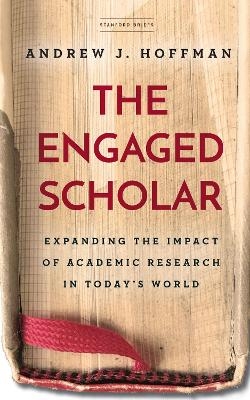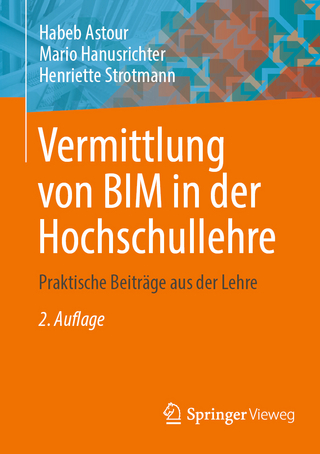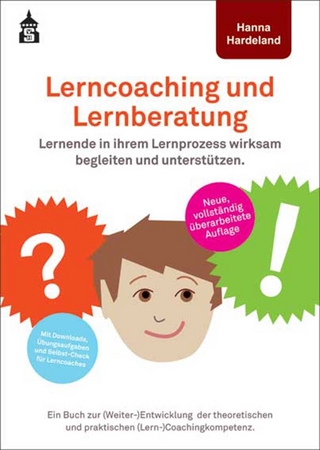
The Engaged Scholar
Stanford Briefs (Verlag)
978-1-5036-1481-9 (ISBN)
Andrew J. Hoffman is the Holcim (US) Professor of Sustainable Enterprise with appointments in the Ross School of Business and the School for Environment and Sustainability at the University of Michigan. He is the author and editor of 18 books, including How Culture Shapes the Climate Change Debate (Stanford, 2015). Among his list of honors, he has been awarded The Page Prize for Sustainability Issues in Business (2020) and the 2020 ONE Teaching Award.
Contents and Abstracts1The Engaged Scholar chapter abstractThe academy is facing a crisis of relevance. While we produce vast amounts of research, much of it has impact beyond the ivory tower to impact public and political discourse. This comes at a time when the quality of that discourse is reaching new lows. This disconnect is dangerous for both society and the academy. Toward finding a solution, the Academy has much to offer. Scientifically derived facts and analysis are our stock and trade, and we have an ability to inform the general public and our politicians about the nature of our problems and potential remedies. We need a more scientifically literate public and more publicly engaged scholars. It is time to reexamine the norms and rules of academia and bring academic research to the public that needs it.
2Limitations of the Academic Reward System chapter abstractThe existing reward structure of the academic research enterprise is leading academic scholars away from public engagement. Its primary focus is on academic journals, and more specifically those that are ranked as "A-journals." This narrow type of outlet focuses on one type of audience – other academic scholars in our narrow disciplines – and one type of language – opaque and obtrusive jargon. This has the consequences that our research reaches a limited audience, is biased towards less-creative and diverse research, timelines that guarantee its irrelevance for public debates, and questionable impact. This system is maintained by a type of inertia that is embedded in our reward systems and our culture. Therefore, that culture must be changed.
3The Rules of Engagement chapter abstractThis chapter presents some alternative "rules of engagement"; models and skills for stepping outside these existing structures and creating impact within real-world debates. To begin, engagement asks us to think of our classroom as extending beyond its physical form on our campus, to include the broader society of which we are a part. Six guidelines from the growing literature on science communication are presented: 1. Find your voice, 2. Tell stories, 3. Avoid the "knowledge deficit model," 4. Know your audience, 5. Rely on solid research, and 6. Change your publication strategy. This chapter concludes with an overview of the political nature of public engagement and the new terrain that this involves.
4Scholarly Uses of Social Media chapter abstractThis chapter discusses the great disruptor of the present context – social media – and the extent to which engaged scholars can embrace this evolving medium in the quest for relevance within today's public and political discourse, developing an entirely new vocabulary, including citation search tools, search engine optimization, DOI numbers, ORCID numbers, and many more.
5Engagement and the Arc of Your Career chapter abstractThis final chapter challenges the engaged scholar to consider a career in its long arc with all its attendant stages and consider the signs that the world of academia is changing, albeit slowly, with conversations over practical impact being engaged in by faculty, deans, presidents, journal editors, journal reviewers, donors, and students. For example, we can see innovations taking place in the training of faculty and doctoral students, the hiring or professional communications staffs, the development of new performance metrics and rules for tenure and promotion, change within the top journals, and changes in accreditation. And in the end, this change will be driven most by a younger generation of scholars who seek to engage in real-world debates through their role as a professor.
| Erscheinungsdatum | 24.02.2021 |
|---|---|
| Sprache | englisch |
| Maße | 127 x 203 mm |
| Themenwelt | Sozialwissenschaften ► Pädagogik ► Erwachsenenbildung |
| Wirtschaft ► Volkswirtschaftslehre | |
| ISBN-10 | 1-5036-1481-6 / 1503614816 |
| ISBN-13 | 978-1-5036-1481-9 / 9781503614819 |
| Zustand | Neuware |
| Haben Sie eine Frage zum Produkt? |
aus dem Bereich


